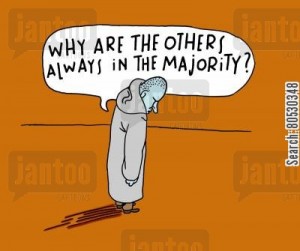[First posted in 2014, absolutely relevant to those in transition from former religions to a Torah lifestyle; a “lifestyle”, not a “religion” — for those who don’t wish to join yet another religion . . . just like us, Sinaites. —Admin1.]
———–
It was Balaam, the gentile prophet, who aptly described to Balak the newly-formed nation of Israel, early in their desert-wandering in Numbers/Bemidbar 23:9:
[AST] For from its origins, I see it rock-like, and from hills do I see it. Behold! It is a nation that will dwell in solitude and not be reckoned among the nations.
[P&H] For from the top of the rocks I see him, And from the hills I behold him: Lo it is a people that shall dwell alone, And shall not be reckoned among the nations.Notice the word used in reference to the people/nation of Israel:
- “it” in AST,
- “him” in P&H, singular, as one.
But notice that as early as its formation, the nation/people of Israel who have been set apart for YHWH’s purposes will “dwell in solitude”, “remain separate”, “dwell alone”, not to be “reckoned” or“assimilated” among the nations.
P&H Commentary:
- from the top of the rocks I see him. Standing on the mountain peak, and looking not with the eyes of fear or envy, he is overpowered by the view he has of Israel below. Curse he cannot. He feels compelled by an irresistible Divine impulse to break forth into jubilant praise.
- that shall dwell alone. Israel has always been a people set apart, a people isolated and distinguished from other peoples by its religious and moral laws, by the fact that it has been chosen as the instrument of a Divine purpose.
- shall not be reckoned among the nations. The Heb. is in the Hithpael and occurs only here in Scripture; lit. ‘does not reckon itself among the nations’. A notable alternative rendering was proposed by Marcus Jastrow. He showed that in Neo-Hebrew the Hithpael of the root signifies ‘to conspire’ (see his Talmudic Dictionary, I, 508), and believes that this is the meaning intended here. ‘Israel is a people that dwelleth alone;
- it does not conspire against the nations,‘ exclaims Balaam; why then shall he be cursed?
What is so “isolating” about these people?
As gentiles who have joined observant Jews in obeying the TORAH of YHWH, we understand because we experience that ‘isolating’ effect or consequence of living TORAH in a TORAH-less or TORAH-ignorant or non-TORAH-observant context which is everywhere else except in the Land occupied by Israelis/Jews. Of course we also recognize that there are individuals who have never read TORAH, yet live by its ethical and moral values and principles, since the inclination to do good balances the inclination to do evil, so that whichever path is taken in life is a matter of personal choice.
Now, what part of TORAH living is discoverable only by reading TORAH?
THAT part is what is so isolating about YHWH’s TORAH, to mention only three:
- Sabbath observance in a Sunday world system, for one.
- Leviticus 11’s dietary prescriptions that define what is “food” to properly fuel the human body, for another.
- Leviticus 23 which describes “My feasts” or the feasts of YHWH as well as the biblical calendar that observant Jews continue to celebrate.
For Jews in community with other Jews, there is no problem in living TORAH. For gentiles like us, Sinaites, who have become aware of TORAH and who have chosen to live it within our gentile context, we find ourselves like the odd man out, no longer fitting in as comfortably in situations that we never had to even think about before.
Examples:
- Finding something ‘kosher’ to eat at festive meals full of sumptuous dishes from the meat of unclean animals is at the least limiting in selections one could eat, and at the most embarrassing because the host is offended that we don’t even wish to sample what he/she went to so much trouble to prepare. At buffets, we are so limited in what we can sample, eating what’s equivalent to a child’s plate while paying the full price! Palates retrained for kosher-food get to the point that what we had previously craved and savored have become unpalatable, distasteful, and even disgusting to the taste in time. Good health is worth the price of such an adjustment and our taste buds have become accustomed to real good food, as fresh and as natural as we can consume it.
- Taking the Sabbath off in a six-day workweek is impossible for Sabbath-keepers if they wish to keep their jobs. The solution? Since Friday sundown is the beginning of Sabbath, we take advantage of that by turning our Friday dinner into special family meals welcoming the Sabbath, borrowing some wonderful Jewish traditions and prayers that bless each member of the family. We are able to claim at least 2/3 of our Sabbath, and report for 8 hours at our workplaces, with a consciousness of how special the day is even when spent at work in service to our Sunday-observant employers. We incorporate at lunch break, an hour of worship. God knows the inclination of the heart; even slaves in Egypt could be Sabbath-observant if their hearts and minds were inclined towards their God, even as their bodies continued to labor, for lack of freedom of choice.
- What about the “Feasts” of YHWH? We choose to follow the biblical calendar in our reckoning of time for special appointed times declared as celebrations or commemorations in Leviticus 23. As gentiles conscious of these dates in the biblical year, we respect the traditions of men by celebrating with them (knowing better!), but celebrate the biblical feasts in ways that we can. [Read: So, do Sinaites celebrate Christmas?] As a community, we welcomed the “head of the year” on Rosh Hashanah (sundown of September 16 this year) and in fact changed the date on our Statement of Faith from Tishrei 5772 when we officially organized ourselves as Sinai 6000, to 5773. We find nothing wrong about celebrating with the world which goes by the Gregorian calendar that reckons this year as 2013 on the first day of its first month named after Janus the Roman god [www.pantheon.org/”January Named after the Roman god of beginnings and endings Janus (the month Januarius)”].
The “isolation” occurs during specific times when man-made traditions, superstition, cultural practices rule over any occasion. At a recent wake of a highly educated man, in fact the dean of a college, non-family sympathizers could not even pay their respects to the dearly departed because the tribal priest had to officially declare the person “dead” (3 days after death). Then family members could not attend the burial rites ‘according to tribal tradition’; sympathizers had to wait hours after the announced time for the necrological service because the tribal chiefs also had to fulfill the slaughtering of pigs right at that time. Then that was followed by a Catholic mass where ‘holy water’ was sprinkled on the coffin among other rites based on Catholic beliefs.
What a strange mixing of religious traditions on the occasion of the death of an individual born in one faith but embraced another. No longer able to make decisions for the disposal of his remains, others made the decision for him. Just as his coffin was being lowered into the freshly dug grave, yet another tribal requirement was imposed—that the coffin top be removed so that the body could be covered with earth.
- Henry Wadsworth Longfellow: “dust thou art, to dust returneth was not spoken of the soul” ;
- Ecclesiastes 12:7 “and the dust returns to the ground it came from, and the spirit returns to God who gave it.”
Ironically, all such death traditions are really for the benefit of the living— the tribal elders and the surviving relatives who were made to conform to such cultural rites—- more than the person who had passed away.
What to do in such situations? Be respectful of the different ‘other’ and still show loving concern for others of differing faiths. Be thankful that YHWH’s Truth and Way do set us free from manmade ways! Until others become aware of YHWH’s TORAH, be patient and kind and appreciate the fact that at least they are believing in God. Perhaps they too will discover the same path we’ve found ourselves on and have been travelling for 4 years now. We are of course ever mindful of the fact that our former Christian colleagues look at us with pity if not regret for having lost our ‘salvation’ since we left our former Christian faith, but that is to be expected, we understand, we once thought ‘that way’ too!
Ultimately, what does it matter that TORAH is isolating as long as it brings one closer to the One True God by living His TORAH, for in effect, that is what true biblical faith is all about.



